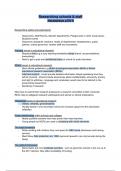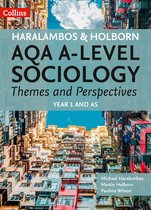Researching schools & staff
Haralambos p191-6
Researching setting and participants
- Classrooms, Staff Rooms, Specific departments, Playgrounds or other social areas,
Students homes
- Classroom assistants, teachers, heads of departments, headteachers, pupils,
parents, school governors, careers staff and counsellors
Practical issues in educational research
- Requires time (e.g a busy teaching timetable) money (travel, accommodations,
transcribing)
- Hard to get a quite and confidential place at school for quite interviews
Ethical issues in educational research
- Strict ethical guidelines e.g British sociological association (BSA) or British
educational research association (BERA)
- Informed consent - (could provide detailed information sheets explaining how they
will be involved - should include assurances about confidentiality, anonymity, privacy
and right to withdraw - language and vocabulary would need to be tailored to the
group being researched)
- Sensitivity of research
May have to submit their research proposal to a research committee at their university.
RECs help to safeguard research participants and advise on ethical implications.
Theoretical issues in educational research
- Validity, reliability, generalisability
- Usually based in one secondary school (to increase rapport but this decreases
reliability)
Power relationships within schools and colleges
- Newly qualified teachers have less power than head teachers
- Young people (or NQTs) are used to complying with adults demands
The legal framework
- When working with children they must pass the DBS check (disclosure and barring
service)
- Must follow Data protection act, 1988 (personal research can only be kept during the
study)
The political framework
- Some topics are more politically sensitive - such as grammar schools in the run up to
the 2017 election. May affect availability of funding
, Researching staff in an educational context
Practical issues in researching staff
Selecting and negotiating access to a research site
- Need to draw on personal contacts (e.g local schools - but might not always be most
appropriate - walford 2001)
- Chair of governors is the ‘gatekeeper’ of the school - more likely to allow access if
understand the aims
- When negotiating the teacher might need to work as a supply teacher or teacher a
number of classes a week (although this might mean students are less open in
interviews as it is an authority figure = reduces validity)
- School might only give access to certain areas to maintain schools image
Gillborn + Youdell (2000) carried out research in tow secondary schools over a 2 year period
- in one school they were restricted to assemblies, parents evening, staff meetings and to
talk to students and teachers informally during tutor groups
Refusal of access
- Gatekeepers priority is the children
- Might restrict at certain times (e.g run up to an ofsted inspection)
- Staff may be reluctant to take part in socially sensitive activities
- Schools will not want to take part if it could cause hard to their reputation
- Research findings may be misrepresented by media to create a ‘good’ story
Negotiating access to the teaching staff
- Teachers might think sociologists are carrying out an inspection/ evaluation
- Additional demand on teachers time
Ethical issues in researching staff
- Informed consent, anonymity, confidentiality
- After collecting data sociologist must report finding to school - causes difficulty when
finding bullying and labelling but hard to report on these without identifying individuals
- Headteacher might not want identity of school to be revealed
Theoretical issues in researching staff
- Some teachers might be aware of the aims = DC + hawthorne effect = decrease in
validity
- Teachers might not give comments incase it gets back to senior management team
- Sample of teachers might not be representative as only given access to trusted
teachers





